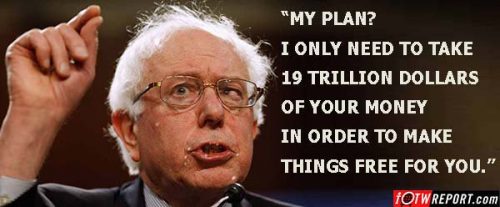
Washington Examiner: In 1981, when Bernie Sanders was serving as mayor of Burlington, Vermont, the current front-runner for the Democratic presidential nomination shocked the crowd gathered to kick off the annual Chittenden County fundraising drive for the United Way when he declared, “I don’t believe in charities.” The mayor, according to a New York Times account, went on to take issue with the “fundamental concepts on which charities are based,” asserting that government should instead be the provider of social services.
What was then a fringe view (in a country that would give more than $400 billion to charities in 2018) would take on the force of tax law, were a Sanders administration to prevail. That’s thanks to the candidate’s proposals to hike tax rates on the affluent and, crucially, to impose for the first time a tax on assets (a “wealth tax”) in addition to one on income. The combination would deeply wound charitable and philanthropic giving, which is dominated by the well-off. It would not only leave less income for potential charitable gifts but would tax wealth that has been pledged but not yet transferred to foundations, universities, or any other nonprofit organization. Like so many other Sanders proposals, it would make the United States look more like Western Europe, where charitable giving (as in Germany) is less than a third of that here. And it’s premised on a false equivalency — that government can and would do the same things and do them as well as charitably funded civil society.
To understand the impact of the Sanders income tax and wealth tax proposals on charity and philanthropy, one must understand that the wealthy are disproportionately the source of both. Williams College economist Jon Bakija has found (in 2009) that those earning more than $200,000 comprised just 2.6% of the population but accounted for more than 29% of charitable giving. The 2018 tax reform law has likely concentrated such giving even more — since only 13% of households now itemize their tax returns and can avail themselves of the charitable tax deduction. Before tax reform, more than 30% itemized. But the rich are different here: Among the wealthiest 5% of people, 72% itemize — and, in light of the limitation of such deductions as that for state and local taxes, may see in charity a still-unlimited tax break.
But a Sanders wealth tax would be a game-changer, especially on top of higher tax rates which will limit the amount of discretionary income available for all purposes, including charitable giving. (One wonders whether he’d even try to get rid of the charitable deduction entirely, in keeping with his 1981 remarks.) Read more

Americans are so batshit insane now that Americans scream slamming a gun against the head of managers and forcing companies to hire workers is not tyranny.
Americans are enslaved today that they say taking the guns of black people is freedom because they are not white.
Americans are so retarded that insist regulations will lower prices and encourage people to start businesses.
Americans want belts to be banned because Americans don’t wear belts.
Americans think outlawing gardens is wonderful because they don’t have gardens.
Americans swear that the Soviet Union was a huge success.
Tyranny is all fun and games until the Gestapo shows up, tortures you, and sends you to the concentration camps.
Someone ask Bernadette if he supports churches losing their tax exempt status.
Self-hating Jew fills his empty soul with the false idol of government. He has never held a job or been a tax payer, only a parasitic tax receiver. He doesn’t believe in charity but gives other people’s money generously to his family members. You would have to be a moron to follow this grifter
I think it all depends on what you consider are real charities as to where you give your own money
think how charitable the clinton foundation has been especially in Haiti
once the only game in town is the government then which charities will receive the money?
only the government will get to decide who gets contributions… planned parenthood, npr…
Well dah. How’s Bernie going buy more beach houses and expensive eurotrash cars if he doesn’t get his cut.
Can’t blame a tyrant for being what he is. I blame the VT and, now, USA voters who give him his power.
I blame our commie infiltrated educational system. Burn it down.
Good charities are the most efficient organizations on Earth. They have to perform well to capture scarce donations. Bad charities go away because they can’t garner donations. Well, unless they manage to worm into government contributions, which is exactly why I think the government shouldn’t be supporting any private organization.
Good charities are basically the opposite of Bernie, who is lazy and wants others to do the work.
Anyone who is a Marxist is an intellectually under powered imbecile.
Eliminating the (government-sanctioned) tax deductions on donations would not eliminate charities, which would not themselves pay taxes in any event because they’re non-profit. It might, however, eliminate a lot of abuses, tax shelters, and fake charities.
“Charity” and “tax-deductible donation” are different things. Eliminating the charitable deduction should go hand-in-hand with the elimination of other abusive tax loopholes, cutting taxes across the board, downsizing bureaucracies, and getting rid of government waste.
That a charitable deduction exists indicates in the first instance that taxation is too high, and thus somehow it’s “okay” for some people to direct what otherwise would be going to government coffers to their own self-directed pet projects. I’m not into supporting, e.g. refugee resettlement organizations, Planned Parenthood, or mosques. Meanwhile, my donations to my church wouldn’t change just because they weren’t tax-deductible.
RETHINK!
Bernie Sanders is essentially wrong about everything. He may well be the “wrongest” person in America and, given the democrats that there are, that’s a amazing accomplishment.